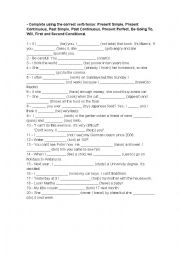

What’s the difference between present simple and past simple for reporting research results? The key is choosing the verb tense that is appropriate for what you’re trying to convey.Ĭlick here for a color-coded illustration of changing verb tenses in academic writing. English is a language that uses many verb tenses at the same time. Other studies have found no gender differences (Rahav and Ronen, 1994). Some studies have shown that girls have significantly higher fears than boys after trauma (Pfefferbaum et al., 1999 Pine & Cohen, 2002 Shaw, 2003). To introduce contradictory findings, so neither is the accepted state of knowledge.“Educators have always been interested in student learning.” “There have been several investigations into…” It implies that whatever is being referred to in the past is still true and relevant today. The present perfect acts as a “bridge” tense by connecting some past event or state to the present moment. The control group of students took the course previously… (Education) We conducted a secondary data analysis… (Public Health)ĭescriptional statistical tests and t-student test were used for statistical analysis. To describe the methods and data of your completed experiment.De Young (1987) found the quality of service to be more important than catching fish in attracting repeat customers. “…customers obviously want to be treated at least as well on fishing vessels as they are by other recreation businesses. Notice how the verb tense changes as the function changes in this example. To introduce other people’s research into your text when you are describing a specific study, usually carried out by named researcher.Past simple tense is used for two main functions in most academic fields. “Shakespeare captures human nature so accurately.” “So I’m walking through the park yesterday, and I hear all of this loud music and yelling. To give a sense of immediacy to past events (called “the narrative present” or “the literary present”).“The dinoflagellate’s TFVCs require an unidentified substance in fresh fish excreta” (Penrose and Katz, 330). To cite a previous study or finding without mentioning the researcher in the sentence.To make general statements, conclusions, or interpretations about previous research or data, focusing on what is known now.

In the conclusion, it says what we now know about the topic and what further research is still needed. In your introduction, the present simple tense describes what we already know about the topic.
#Verb choose past tense how to#
This handout will help you understand how to use these three verb tenses in your own academic writing.Ĭlick here for a color-coded illustration of changing verb tenses in academic writing. The present simple, past simple, and present perfect verb tenses account for approximately 80% of verb tense use in academic writing.


 0 kommentar(er)
0 kommentar(er)
